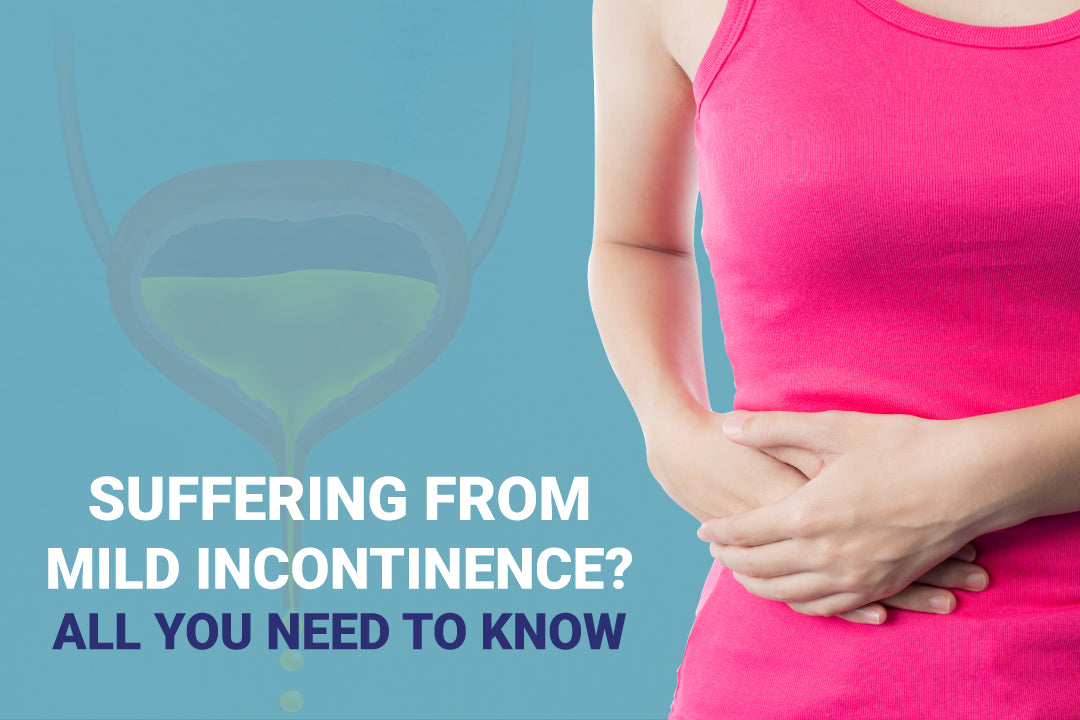Suffering From Mild Incontinence? All You Need To Know

Urinary incontinence is the unintentional bladder leakage experienced by many aging humans. As common as incontinence is in aging adults, there are instances where a middle aged adult may experience occasional minor loss of urine. If you are one of those adults, what you are experiencing is known as Mild Incontinence.
Causes of Mild Incontinence
It is important to understand that urinary incontinence is a symptom and not a disease. It could be caused by several reasons such as routine behaviors, health issues, or physical ailments.
Some important causes may include:
- Urinary Tract Infections (UTI): UTIs can sometimes irritate the bladder and cause temporary Incontinence in some people. Another reason that may cause mild incontinence is constipation in some cases. The urinary bladder shares the same nerves as the rectum that is located near it. In certain cases, a hard stool can cause these nerves to be overactive and thus increase the urine frequency.
- Prostate Problems: Men who have undergone prostate surgery or suffer from prostate enlargement tend to have Stress or Urge Incontinence.
- Overweight: Having excessive body weight can create more pressure on the bladder which may then lead to incontinence.
- Neurological Disorders: Our brain, spinal cord, and other nerves in the body are all controlled by our nervous system. It also plays a vital role in controlling the storage and passing of urine. Needless to say, any damage to our nervous system can interfere with the nerve signals controlling the bladder movement, thus leading to incontinence.
- Menopause: In certain cases, women produce less estrogen after they hit menopause. This may weaken their urethra. The weakened urethra may in turn impair their power to hold urine for much longer intervals.
- Pregnancy: Hormonal changes or the subsequent increase in the weight of the fetus causes Stress Incontinence among many pregnant women.
- Childbirth: Natural delivery or use of the forceps can weaken the muscles needed for bladder control, leading to a lowered pelvic floor. The bladder, rectum, uterus, or small intestine can get displaced from their original position and sometimes protrude into the vagina, resulting in urinary incontinence in women.
Mild urinary incontinence is generally caused by temporary factors such as infections, weight issues, health issues, unhealthy lifestyle, diet, etc.
Types Of Urinary Incontinence
Given below are four categories urinary incontinence can be categorized as:
- Urge incontinence is when urine leaks out as a result of an immediate, strong urge to urinate, such as while coughing or laughing.
- Stress incontinence is caused when urine leaks occur at times when the bladder is put under pressure.
- Overflow incontinence (chronic urine retention) is the frequent leaking that results from not being able to empty your bladder fully.
- Total incontinence is when your bladder is completely unable to hold any pee, causing you to constantly leak or pass urine.
Additionally, stress urinary incontinence and urge incontinence can coexist. Mild incontinence can be a result of stress, urge or overflow incontinence.
Mild incontinence can be tackled with utmost care and the right products. Now it is important to note that instead of opting for regular adult diapers, people with mild incontinence can go for Dignity Light Inco Pads that are specially designed to tackle light incontinence in men and women.
Dignity Light Inco Pads are anatomically designed pads to provide a thin and discreet fit. The Super Absorbent Polymer in the core absorbs and converts the fluid into the gel rapidly. It also helps maintain the pH balance and neutralizes any unpleasant odor making the wearer comfortable. Its Anti-Leak Leg Cuffs prevent side leakages due to pad displacement or body movement.
Mild incontinence is usually temporary and can be managed by following a healthy diet and lifestyle. Avoid consuming beverages containing alcohol, caffeine, carbonated soft drinks, sparkling water, or artificial sweeteners. Additionally, do away with certain foods like citrus, chocolate, chili peppers, hot or acidic foods, or even chilies that might cause mild bladder leakages. Some patients experience incontinence when taking certain sedatives, muscle relaxants, or heart or blood pressure medications. In this case, consult your physician.
A person can recover from mild incontinence over time by making a few changes in their daily lifestyle. Until then, it is highly advisable to invest in light inco pads to manage your days with incontinence better.


